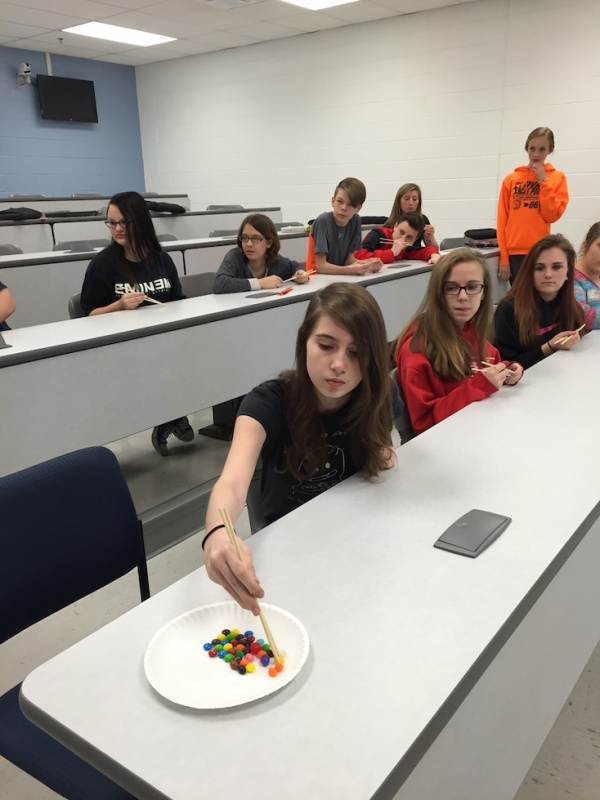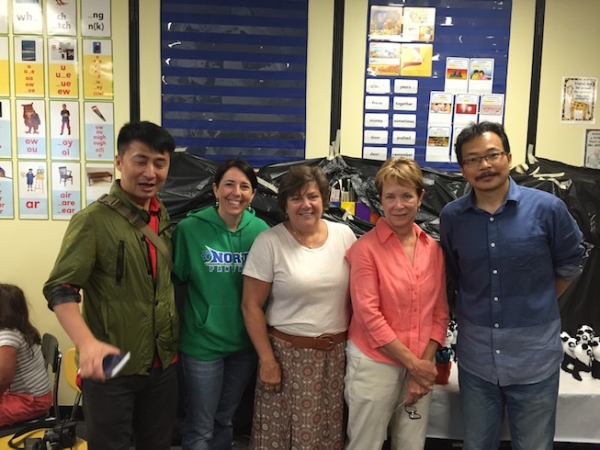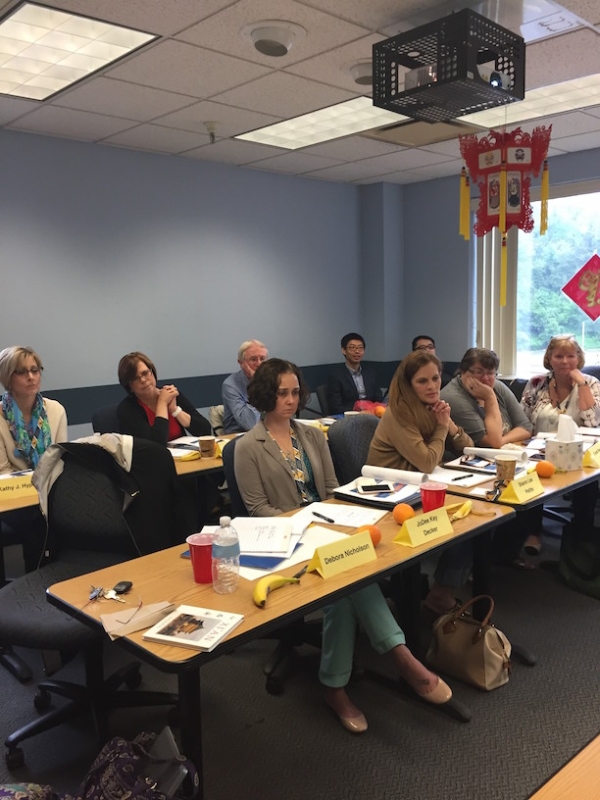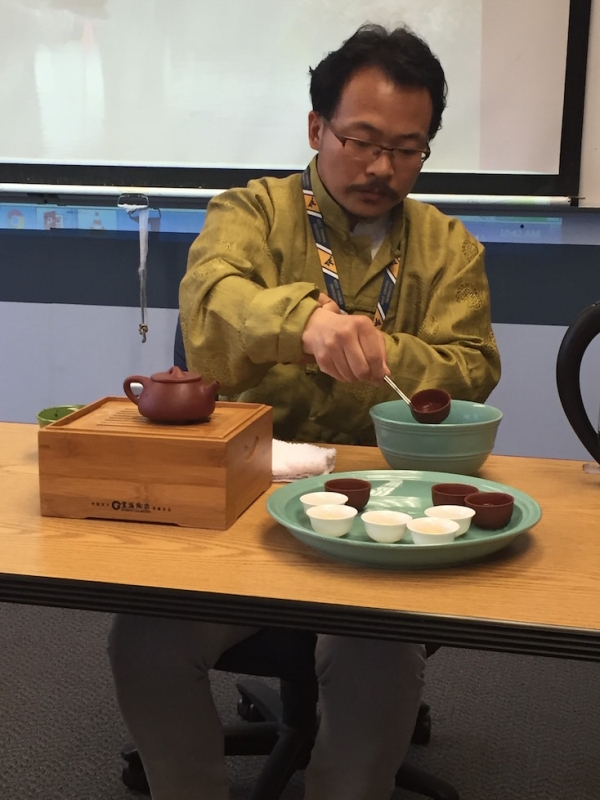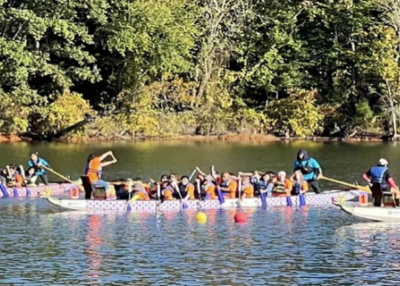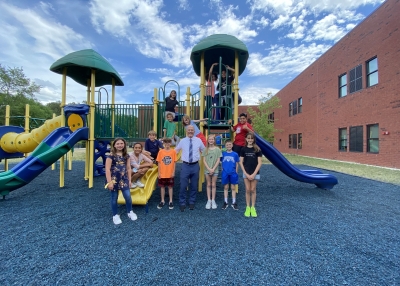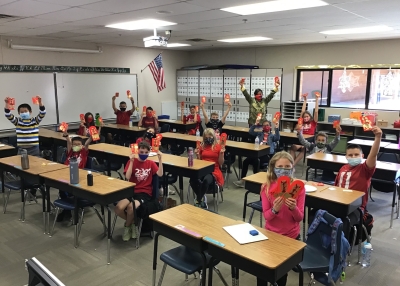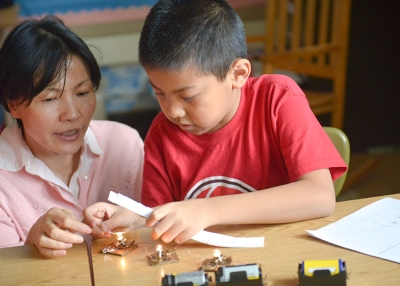West Virginia Department of Education
West Virginia Department of Education
Serves students in grades Pre-K–8
wvde.state.wv.us
Program Description
The West Virginia Department of Education oversees more than 270,000 students, in 55 school districts and in grades Pre-K to 12. Six College Board Guest Teachers and three local teachers in the state serve 30 schools that offer Chinese language instruction.
In 2006, Dr. Stephen Paine, then Superintendent of West Virginia Schools, traveled to China with the Chinese Bridge Delegation sponsored by the College Board and Hanban (Confucius Institute Headquarters responsible for promoting the study of Chinese worldwide). When Dr. Paine returned, he shared the experience and information with individuals from various school districts. Three counties applied for and were chosen to serve as host institutions for the Guest Teachers. Members of the National Council of State Supervisors of Languages traveled to China to interview and select candidates. The interviewers studied each school’s application and attempted to find a Guest Teacher who best suited the demographics and needs of the school.
Since then, the number of teachers has tripled, and the number of students learning Chinese language and culture has increased exponentially. Of the nine Chinese teachers in West Virginia, five teach students at the elementary school level. One other teacher splits her time between elementary and secondary schools and visits the elementary schools two days per week.
All of the programs in West Virginia are currently world language classes, with a focus on culture as well as on language. Although there may be some overlap with other content areas (music, art, etc.), language learning occurs in the Chinese classes. At the elementary schools, this is typically 30–40 minutes per week. At the middle school and high school levels, students are in Chinese language classes for a little more than four hours per week.
West Virginia is a small, rural state, where cultural diversity is not the norm. The phenomenal growth and increased interest in the learning of Chinese is the result of the work of various organizations throughout the state that have collaborated to promote the study of the Chinese language and culture. Each has made priceless contributions to expanding the program, whose work and contributions are described here.
Monongalia County Schools
Monongalia County Schools are at the forefront of world language education in the state and pioneers in Chinese language study. This school district, located in the same town as the state’s largest public university, is one of the most culturally diverse areas in the state. The local community and the school system have realized the importance that the Chinese language will play in the future of their children. Chinese is taught in all three high schools in the district and in three of the five middle schools in the county. In addition, all students in five of the county’s ten elementary schools receive Chinese instruction at least one time per week. Approximately 3,500 students in the school district receive Chinese instruction in the 2016–2017 school year.
Collaborating with the West Virginia Department of Education, Monongalia County Schools has offered a STARTALK summer immersion camp for elementary students for the past seven years. Approximately 80 students spend 10 days immersed in the Chinese language and culture, with follow-up activities in the fall and spring. The proficiency-based instruction affords students the opportunity to communicate with native speakers in Chinese. An exciting part of the camp is the student volunteer program. For the past three years, teenage students from China have traveled to West Virginia to work at the camp. Their presence is one of the most outstanding parts of the camp. The younger students relate well to and respect these teenagers, and they have additional incentives to use the language so that they are able to communicate with them.
North Elementary School in Monongalia County was one of the 100 schools nationwide to be designated as a part of the Asia Society’s Confucius Classrooms Network. They have established a sister school relationship with Yandaijie Primary School in Chengdu, and representatives from Monongalia County Schools have visited the school there to solidify the relationship.
Confucius Institute for Business West Virginia
The Confucius Institute, located in the College of Business and Economics at West Virginia University, has only been in official operation since August, 2015, but it has quickly integrated itself into the teaching of Chinese in the state. The mission of the Confucius Institute is to promote understanding between the people of West Virginia and the people of China. Realizing that one way to do this is to provide our students with the tools they need to become global citizens, one focus of the Institute is on promoting the study of the Chinese language and providing professional development and resources to instructors who are teaching the language in the school system.
In May, 2016, the Confucius Institute for Business West Virginia sponsored a trip to China for nine West Virginia Superintendents, Assistant Superintendents, Curriculum Coordinators, and Principals. The main purpose of the trip was to observe and further understand the Chinese education system. The delegation visited various schools in Tianjin, Beijing, and Xi’an. Some of the schools established sister schools with interested partners in these cities.
Another unique approach that the Confucius Institute undertakes is the building of homegrown teacher capacity in the state. Any certified West Virginia teacher interested in learning, and ultimately becoming certified to teach Chinese, is encouraged to attend the Chinese language courses that the Confucius Institute offers at the university level. The classes meet every Saturday, and there is additional work to be completed during the week. This will be a three-year process for the participants, but tuition is waived, and participants are only responsible for the cost of taking a standardized test at the end of each semester. Those who score in the top 30% are able to go to China as an incentive to continue studying and doing well.
Regional Educational Service Agency (RESA) VII
In the spring of 2015, the Executive Director of RESA VII decided that she would like to help offer Chinese to the smaller counties that are not able to sustain a Guest Teacher on their own. She decided to apply for a Guest Teacher and offer Chinese through virtual courses. Three different schools were afforded the opportunity to offer a full year of Chinese I at the 8th grade level and above and a semester-long exploratory class at the 7th grade level. These schools are located in rural areas of the state, and the students would not otherwise have the chance to study Chinese. During the second year of the program, semester-long exploratory classes and full-year Chinese I and II courses were offered to the same group of students. In addition, the Guest Teacher spends two days a week in the elementary schools of one county school system. During this time, she provides an introduction to Chinese language and culture.
RESA VII developed a sister school relationship with Mudanjiang Number 2 High School in Heilongjiang Province. As part of this relationship, four students and two teachers from Mudanjiang Number 2 High School volunteered at the STARTALK camp held in Monongalia County. They spent two weeks working with the camp and motivating students to speak in the Chinese language. The teachers were so impressed with the activities during the camp that they returned to their school, spoke with the school administrators, and began planning an English immersion camp to be held during their winter break 2015-2016. Two teachers from RESA VII and one administrator from the West Virginia Department of Education traveled to Mudanjiang to deliver the camp. Over 60 tenth grade students from Mudanjiang Number 2 High School devoted one full week of their winter vacation to expanding their knowledge of the English language and American culture.
When asked about their experiences, one Chinese student who volunteered at the camp in Morgantown, WV, stated that, “The experience from the camp was incredible. I often remember it and share it with all of my friends.” Another Chinese student who attended the English camp in Mudanjiang recalled her experience: “The first day of the camp I did not understand many things that the teacher said. But on the last day, I was able to understand almost everything. My English has improved so much.” The project director of the STARTALK camp stated that, “The volunteers provide such a great cultural experience for our students. They naturally admire teenagers, and the fact that these young people spoke the language that they were learning provided them with additional incentives to try to use what they had learned.”
West Virginia Department of Education
In 2009, the West Virginia Department of Education received a Foreign Language Assistance Program (FLAP) grant to create an elementary school program, recorded on DVD, designed to be facilitated by classroom instructors who had no previous knowledge of the Chinese language. The space-themed program is proficiency-based and immersive, and the teachers received training in delivery of the program. Each lesson is divided into five segments. The first segment is essentially the same for each lesson, as it shows the spaceship during lift-off and the students are able to practice the numbers from 1–10. The concept of the lesson is introduced through a directed question. The next session introduces the five to seven vocabulary terms that are the focus of the lesson. The third and fourth segments allow students to practice and demonstrate recognition of the vocabulary terms. The final segment is a review of the content learned during the lesson, followed by the spaceship lift off. The teacher can replay any of the segments multiple times, depending on the comprehension of the students. The teacher is provided with detailed lesson plans, flashcards, practice sheets, and all of the resources needed to complete the lesson.
The program was piloted in 10 elementary schools during the 2010 school year. During this pilot program, native-speaking conversational coaches were assigned to each school. At the end of the year, a Simulated Oral Proficiency Assessment (SOPA) was administered, and students performed extremely well. As a result of the use of this program, two full-time, native Chinese-speaking instructors were added in Monongalia County to take the place of this program. The program remains available and is used sporadically throughout the state and also in Massachusetts. When a Chinese teacher happened upon a presentation that explained the program, she asked for the program, and it was sent to her for use in her classroom.
Policy 2510: Assuring Quality of Education: Regulations for Education Programs, approved by the West Virginia Board of Education in 2016, outlines requirements for all academic programs for West Virginia schools. This policy emphasizes the need for school systems to provide students with the opportunities to develop global competence. As determined by the policy, global competence includes the “knowledge, skills, and dispositions that focus on students’ understanding of and effective participation in their world.” In addition, the policy mentions the importance of being able to communicate in another language in order to fully reach an acceptable level of global competence. The West Virginia Department of Education works closely with all of the above organizations to expand interest in the Chinese language and culture.
Program Contacts
Debbie Nicholson
Coordinator, World Languages, West Virginia Department of Education
[email protected]
304-624-6554 ext. 242
Sandy DeVault
Administrative Assistant to the Superintendent, Monongalia County Schools
[email protected]
304-291-9210 ext. 1500


